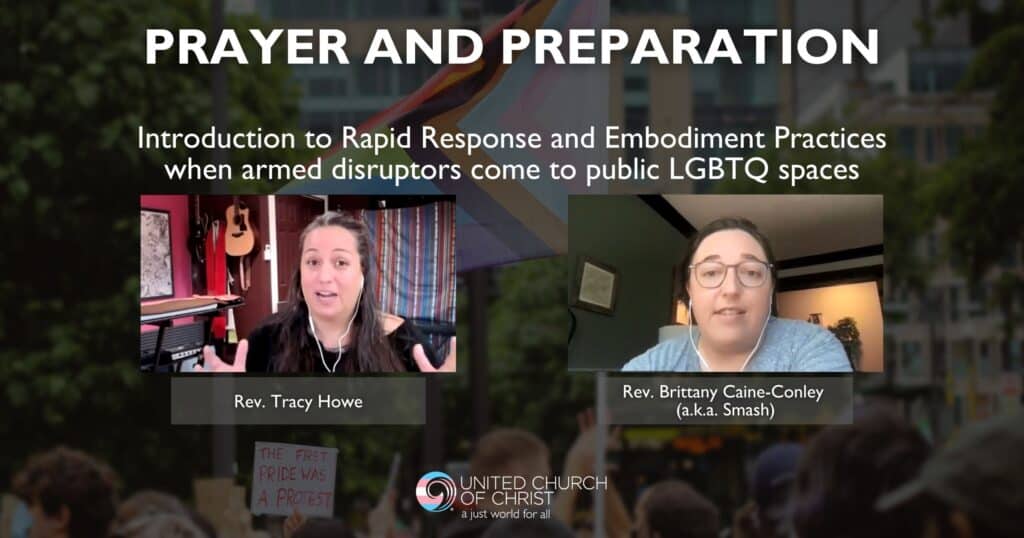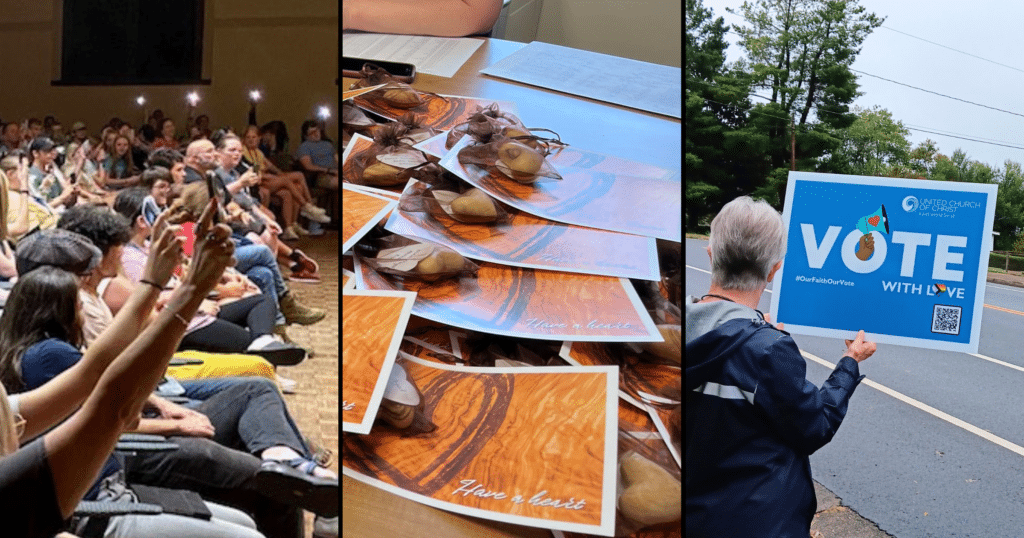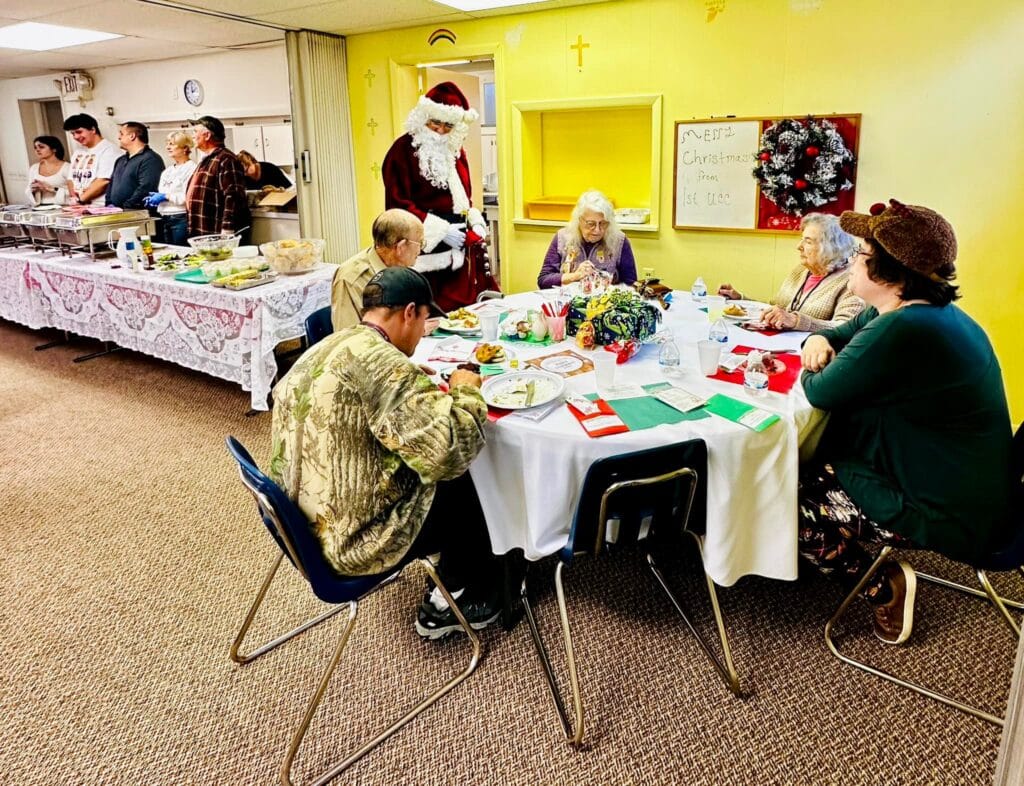Rapid response webinar offers help for churches facing threats from hate groups
Across the country, LGBTQ+ people, youth and families and their communities have come under threat from hate groups, emboldened by a recent rise in anti-LGBTQ+ laws.
As attacks and disruptions of public events increase, many United Church of Christ congregations are looking for a way to respond to this growing danger.
“Very few of our local churches — and none on their own — are equipped for this kind of mass, organized, violent hate,” said Rev. Tracy Howe, minister for Congregational and Community Engagement, Justice and Local Church Ministries. That’s why she decided to lead a webinar during Pride month on rapid response and preparedness. The recording of the workshop is available for free from Frontline Faith, the UCC’s online learning platform.
The pop-up training session, initially promoted as a transgender justice webinar, was organized in just two days and drew more than 100 people online.
‘Build real relationships’
The presentation includes:
- Background information on white supremacist, fascist and neo-Nazi groups;
- Case studies of recent LGBTQ+ community events that these groups tried to disrupt;
- Details on how to develop preparedness plans for staying safe;
- And resources for building teams and coalitions that can help protect communities — especially LGBTQ+ individuals — from public threats.
In addition to the webinar, Howe noted that further training and resources are available through the course page on Frontline Faith. “But relationship and trust is the starting place for increased security and community, no matter what,” she added. “I urge congregations to build real relationships with local organizers who represent communities being targeted by hate groups — such as QTBIPOC (Queer, Trans, Black and Indigenous People of Color) and immigrant organizers — and come from a place of desiring to learn what is already happening in their area to deal with hate and violence in all its forms. None of us can confront or change these things on our own.”
Howe stressed that the workshop is not a training for nonviolent direct action. But it does offer concrete steps on how to prepare a rapid response plan for staying safe. And churches are using this information to do just that.
“One church had a couple of members attend the training, and now they are developing a more comprehensive church safety plan,” Howe said. “Many are seeking out the training to share with a wider audience within their congregations, such as committees planning for Pride events. Several have sought additional resources about making their church building and properties a kind of sanctuary space for the most vulnerable.”
From Charlottesville to Jan. 6
Responding to organized white supremacist violence is not new to Howe. She and her webinar co-host, Rev. Brittany Caine-Conley (a.k.a. Smash), helped organize Congregate Charlottesville in 2017 to stand in opposition to the racist demonstrators that descended upon Charlottesville, Va., that August. From that moment through the Jan. 6, 2021, insurrection at the Capitol Building to now, Howe said the increase in such threats is unmistakable.
“There have been growing, organized white supremacist and fascist groups, including everything from armed militias, neo-Nazis and white Christian nationalist/fascist groups, over the last number of years, increasingly emboldened to organize public action and violence,” Howe said.
“In both Charlottesville, where a large number conspired to bring violence and gather the summer of 2017, to those that organized and participated in the Jan. 6 insurrection, it is important to note that in both these instances, they were/are simultaneously being indicted and convicted of crimes and growing in membership and resources.”
‘Training is critical’
During the webinar, Caine-Conley warned that the rash of disruptions at Pride festivals, drag shows, and other public LGBTQ+ events was not random, but in fact well-organized.
“This is a continuation that we’ve seen from a lot of these groups who’ve been doing the same type of thing for any type of events that celebrate people of color or if we’re taking down our racist monuments,” Caine-Conley said. “We’ve seen these same groups show up in the past five, six, seven years for a lot of different reasons. But the focus has really turned toward anti-LGBTQ+ action and rhetoric lately.”
Because of this, Howe believes the moment is now for churches and members to learn how to protect themselves and their LGBTQ+ communities.
“The training is critical, I believe, because it is about recognizing a new reality we are in and the stakes that come with simply being present to care for one another and proclaim dignity and humanity of folx rooted in the Gospel, be that your Sunday worship service or a public community event,” Howe said. “I imagine the need will continue. I am hoping, though, that instead of rapid response trainings, deeper learning opportunities for community and congregational organizing will open as our local churches continue in this important work.”
Register for free for this on-demand training here.
Content on ucc.org is copyrighted by the National Setting of the United Church of Christ and may be only shared according to the guidelines outlined here.
Related News
Year in Review: Top news highlights of 2024
The United Church of Christ News team has spent each week of 2024 delivering stories that...
Read MoreNo more lonely little Christmases: Chasing away the blues now and into the New Year
With the loneliness epidemic in the U.S. continuing to affect every one in five people, many...
Read MoreUCC Annual Report video brings to life impactful ministries
Leaders of the United Church of Christ are thrilled to share the newly released 2024 Annual...
Read More


